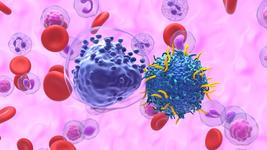Intellia Therapeutics Announces Publication of Positive Interim Phase 1 Data for NTLA-2002 in Hereditary Angioedema
CMN Intelligence - The World’s Most Comprehensive Intelligence Platform for CRISPR-Genomic Medicine and Gene-Editing Clinical Development
Providing market intelligence, data infrastructure, analytics, and reporting services for the global gene-editing sector. Read more...
Hereditary angioedema (HAE) is a rare genetic disease that is characterised by severe inflammatory attacks with swelling in various organs and tissues. Plasma kallikrein is a protein known to drive multiple inflammatory pathways, including the production of the inflammatory mediator bradykinin, which is overproduced in HAE. Plasma kallikrein inhibition is among the current treatment approaches to HAE.
NTLA-2002 is designed to knock out the target gene kallikrein B1 (KLKB1) in hepatocytes. This gene encodes prekallikrein, a precursor of plasma kallikrein, thus its knockout permanently reduces plasma kallikrein activity and halts the production of bradykinin to prevent HAE attacks.
NTLA-2002 is administered intravenously as a single dose of Cas9 mRNA and gRNA via lipid nanoparticles. Pre-clinical studies demonstrated sustained and therapeutically relevant reduction in plasma kallikrein activity following a single dose in non-human primates, and the candidate is currently being evaluated in a combined Phase 1/2 clinical trial to evaluate its safety, tolerability, pharmacokinetics, and pharmacodynamics.
Clinical data from the Phase 1 dose-escalation portion of that trial, published in the New England Journal of Medicine, revealed that a single dose of NTLA-2002 led to robust, dose-dependent, and long-lasting reductions in total plasma kallikrein levels, and no severe adverse events were observed. Furthermore, Intellia reports reductions in the number of angioedema attacks per month at all dose levels (25 mg, 50 mg, or 75 mg), in exploratory analyses.
Read the article in The New England Journal of Medicine here.
Related CMN articles
Intellia Therapeutics Announces Positive Phase 1 Data From CRISPR Trial in Hereditary Angioedema
Tags
ArticleCMN BriefsNewsIn vivoHereditary angioedema, HAEIntellia Therapeutics, Inc.
CLINICAL TRIALS
Sponsors:
Base Therapeutics (Shanghai) Co., Ltd.
Sponsors:
Base Therapeutics (Shanghai) Co., Ltd.







